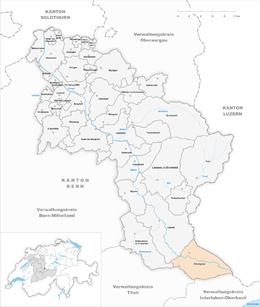Schangnau
| Schangnau | ||
|---|---|---|
 |
||
|
||
| Coordinates: 46°49′N 7°51′E / 46.817°N 7.850°ECoordinates: 46°49′N 7°51′E / 46.817°N 7.850°E | ||
| Country | Switzerland | |
| Canton | Bern | |
| District | Emmental | |
| Government | ||
| • Mayor | Ulrich Gfeller | |
| Area | ||
| • Total | 36.48 km2 (14.09 sq mi) | |
| Elevation | 630 m (2,070 ft) | |
| Population (Dec 2015) | ||
| • Total | 905 | |
| • Density | 25/km2 (64/sq mi) | |
| Postal code | 6197 | |
| SFOS number | 0906 | |
| Surrounded by | Eggiwil, Eriz, Flühli (LU), Habkern, Marbach (LU), Röthenbach im Emmental | |
| Website |
www SFSO statistics |
|
Schangnau is a municipality in the administrative district of Emmental in the canton of Bern in Switzerland.
Schangnau is first mentioned in 1306 as Schoengowe.
By the 14th century the Ministerialis (unfree knights in the service of a feudal overlord) family of Sumiswald, in service to the Kyburgs, owned most of the village. Between 1363 and 1389 they sold their land and rights to the local nobleman Jost von Wald. His descendents sold the village to the city of Bern in 1420. By the second half of the 15th century both Bern and Lucerne claimed the village as they attempted to expand their borders to the detriment of the other. In 1470 a border treaty established Bernese ownership over Schangnau.
Originally Schangnau and the nearby village of Marbach, today a part of Escholzmatt-Marbach in the Canton of Lucerne, formed part of the parish of Trub. In 1524 the two villages broke away from Trub to form the parish of Marbach-Schangnau. A few years later, in 1528, Bern adopted the new faith of the Protestant Reformation and the village converted. A Reformed church was built in Schangnau in 1536 and in 1594 it separated from Marbach to form a parish. The village church was replaced with a new building in 1618. In the 17th century, as religious tension increased in Switzerland, Schangnau's location on the border with Catholic Lucerne became important. After the first First War of Villmergen in 1656, Bern made Protestant Schangnau into a market town to offset the nearby Catholic market town of Escholzmatt.
...
Wikipedia



